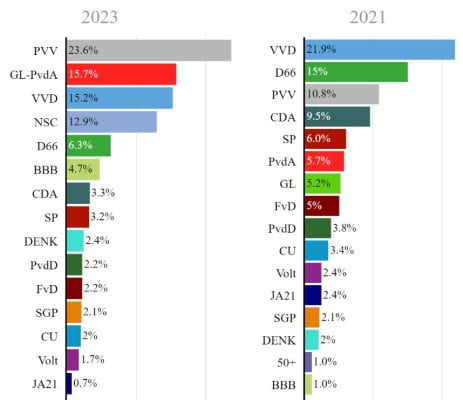BY GILBERT GENEVER-JONES
The Netherlands like many other modern democracies is constantly changing as the political standpoint of the people develops in relation to ongoing events. In this article I will discuss the origin of the Dutch political system and the results of the 2023 election. Alongside what the party ideals are.
The Netherlands operates under a constitutional monarchy and has been doing so since 1815 when the House of Representatives was set up. Similar to the UK, the Netherlands has a monarch who acts more as a figure head of the state and holds no political power. The organisation of the Dutch state is based on the ‘trias politica’ (the separation of powers) originally constructed by Charles-Louis de Montesquieu who was a French philosopher living from (1689-1755). He stated that the political system must be split into the legislature, executive, and a judiciary.
The beginning of Dutch politics really begins in 1814 when the Constitution created by liberal Johan Rudolph Thorbecke (1798-1872) was formulated (not to be confused with the proposed French modelled first addition formulated in 1798 when the Netherlands was occupied by Napoleon) he intentionally made it difficult to be altered to stop it from being modified following a change in the political sphere. He did this by setting a precedent that any time a motion to amend the constitution is wished to be passed it must be passed by both chambers of parliament twice. Once as a normal bill and again after a general election, then it must be passed by 2/3 majority in both chambers.
By 1870 the monarch Willem Alexander Paul Frederik Lodewijk (William III) and parliament had been locked in a constant power struggle, following some political conflicts it became evident that parliament is sovereign. The Kings power becomes limited to minor influence over forming the government following the first partial general election in June 1871 in which 40 of the 80 seats in the House of Representatives were decided. The House consisted of: 43 Liberals, 15 Conservatives, 13 Catholics, 4 Anti-Revolutionaries, and 4 Conservative Liberals. In total 60,443 people voted out of a potential 100,336 who were eligible to. In 1917 a constitutional amendment granted universal suffrage to men and then by 1919 the franchise was expanded to include women. The amendment additionally incorporated a switch from the UKs ‘first past the post’ system to a form of proportional representation. The Dutch claim the general principles of their political system have not wavered since.
The Modern day – 2023 Election

Mark Rutte the previous PM and leader of the VVD, who’s premiership spanned from 2010-2024 government collapsed over migration policies in July announced he would not be standing for a second term in power. Due to this a strong opening arose for far right wing politician Geert Wilders leader of the Party for Freedom (PVV) who took 23.6% of the vote earning 37 seats. His parties ideals are: a ban on mosques, ban on Qurans. Aswell as being Eurosceptics, climate change sceptics and are planning an increase in restrictions for immigrants.
In second place was a coalition of Green-Labour (GroenLinks-PvdA). This a very centre left coalition headed by Frans Timmermans (former foreign minister) they earnt 15.7% of the vote resulting in 25 seats in the house of representative. His campaign focused on climate change, housing affordability, and minority rights. They gained the best result for a centre-left party in almost a decade which his odd considering the increase in votes for far right anti-immigration parties.
In 3rd was the VVD the previous party in power taking 15.2% of the votes and 24 seats in the house. Since this year they had won every election since 2010. Dilan Yeşilgöz took over from Mark Rutte as party leader. If she won she would have been the Netherlands first female PM. She is considered to be further right than Rutte and has stronger anti-immigration views than her predecessor.
In 4th a new party named ‘New Social Contract’ (NSC). They took 12.9% of the vote resulting in 20 seats. Led by Pieter Omtzigt who is a former Christian-Democrat. His relevance comes from his involvement in exposing the childcare benefits scandal which was a considerable factor for the downfall of Ruttes government. His campaign consisted of: transparency, government reform, democratic overhaul and limiting immigration.
Geert Wilders has reluctantly been forced to give up on becoming PM as the other parties coalition would result in his leadership being consistently undermined. The formation of ‘The populist Farmer-Citizen Movement and centre-right New Social Contract’ alongside the although smaller still powerful VVD party. Hence relinquishing his position to Dick Schoof who will still be running his government with 5 ministers from Wilders’ PVV and 2 from the Farmer Citizen Movement.
Schoofs’ previous position was head of Dutch intelligence (AIVD) and senior official at the ministry of justice. He was put in over concern of Wilders stability. This was unpopular with the far right as Wilders was seen as the most persuasive leader in public opinion polls and even limited his extremities in his campaign stating that he “was willing to make concessions on his anti-Islam policies” stating that “there are more important priorities.
In conclusion, we are seeing a movement towards more extremist right wing parties in an effort to combat the foregoing immigration crisis. This is a worrying time as it may lead to more oppressive views and lead to people feeling hostile to immigrants. It is key that the House of Representatives remains balanced as it is known that a strong concentration of power only further enhances the oppression of the minority.
